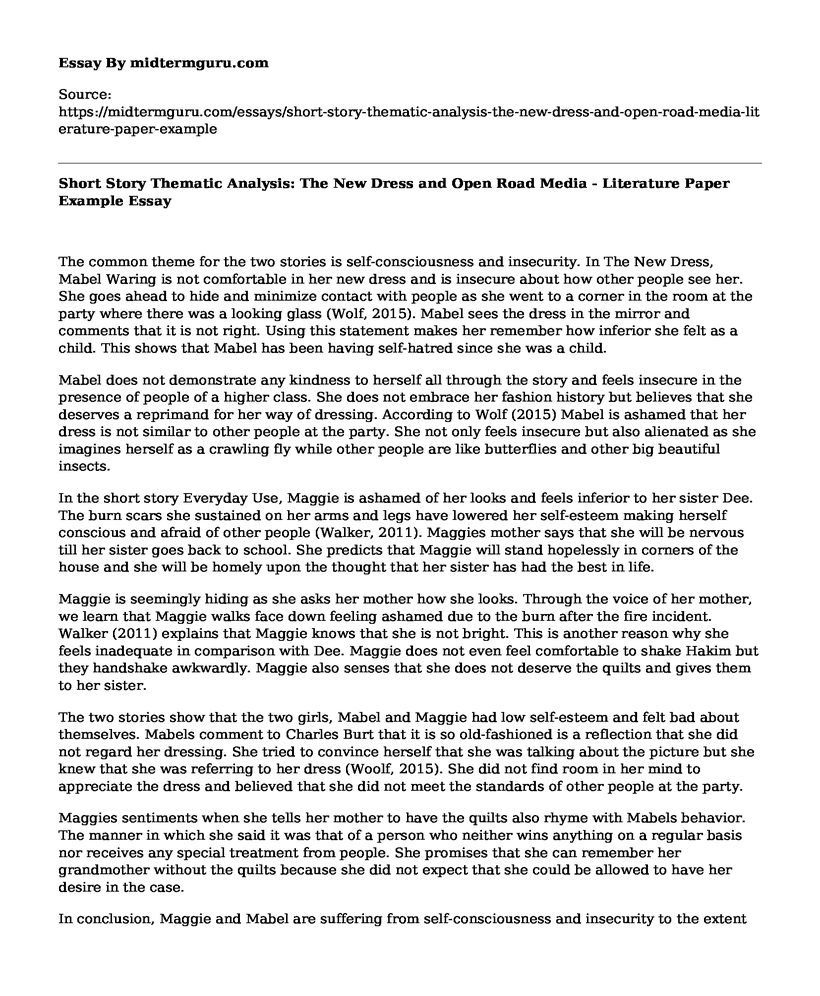The common theme for the two stories is self-consciousness and insecurity. In The New Dress, Mabel Waring is not comfortable in her new dress and is insecure about how other people see her. She goes ahead to hide and minimize contact with people as she went to a corner in the room at the party where there was a looking glass (Wolf, 2015). Mabel sees the dress in the mirror and comments that it is not right. Using this statement makes her remember how inferior she felt as a child. This shows that Mabel has been having self-hatred since she was a child.
Mabel does not demonstrate any kindness to herself all through the story and feels insecure in the presence of people of a higher class. She does not embrace her fashion history but believes that she deserves a reprimand for her way of dressing. According to Wolf (2015) Mabel is ashamed that her dress is not similar to other people at the party. She not only feels insecure but also alienated as she imagines herself as a crawling fly while other people are like butterflies and other big beautiful insects.
In the short story Everyday Use, Maggie is ashamed of her looks and feels inferior to her sister Dee. The burn scars she sustained on her arms and legs have lowered her self-esteem making herself conscious and afraid of other people (Walker, 2011). Maggies mother says that she will be nervous till her sister goes back to school. She predicts that Maggie will stand hopelessly in corners of the house and she will be homely upon the thought that her sister has had the best in life.
Maggie is seemingly hiding as she asks her mother how she looks. Through the voice of her mother, we learn that Maggie walks face down feeling ashamed due to the burn after the fire incident. Walker (2011) explains that Maggie knows that she is not bright. This is another reason why she feels inadequate in comparison with Dee. Maggie does not even feel comfortable to shake Hakim but they handshake awkwardly. Maggie also senses that she does not deserve the quilts and gives them to her sister.
The two stories show that the two girls, Mabel and Maggie had low self-esteem and felt bad about themselves. Mabels comment to Charles Burt that it is so old-fashioned is a reflection that she did not regard her dressing. She tried to convince herself that she was talking about the picture but she knew that she was referring to her dress (Woolf, 2015). She did not find room in her mind to appreciate the dress and believed that she did not meet the standards of other people at the party.
Maggies sentiments when she tells her mother to have the quilts also rhyme with Mabels behavior. The manner in which she said it was that of a person who neither wins anything on a regular basis nor receives any special treatment from people. She promises that she can remember her grandmother without the quilts because she did not expect that she could be allowed to have her desire in the case.
In conclusion, Maggie and Mabel are suffering from self-consciousness and insecurity to the extent that their interaction with other people is affected. The poor self-image makes them very uncomfortable in social situations. Mabel feels that her dress is out fashioned and does not cherish its history while Maggie feels that it is her sister who deserves the cute quilts and not her.
References
Woolf, V. (2015). The new dress. Bookclassic.
Walker, A. (2011). In Love & Trouble: Stories. Open Road Media.
Cite this page
Short Story Thematic Analysis: The New Dress and Open Road Media - Literature Paper Example. (2021, Jun 04). Retrieved from https://midtermguru.com/essays/short-story-thematic-analysis-the-new-dress-and-open-road-media-literature-paper-example
If you are the original author of this essay and no longer wish to have it published on the midtermguru.com website, please click below to request its removal:
- Theme of Disillusionment in the Invisible Man by Ralph Ellison
- The Hollow Men by Eliot - Poetry Analysis Paper Example
- To Waken an Old Lady by William Carlos Williams - Literature Essay Sample
- Analysis of Sonnet 18 Shakespeare - Literature Essay Sample
- Poetry Analysis Essay on "The Passionate Shepherd to his Love" and "The Nymph's reply to the Shepherd"
- My research topic is: Maintaining Academic integrity among undergraduate students
- Literary Analysis Essay on "Punished by Rewards" by Alfie Kohn







